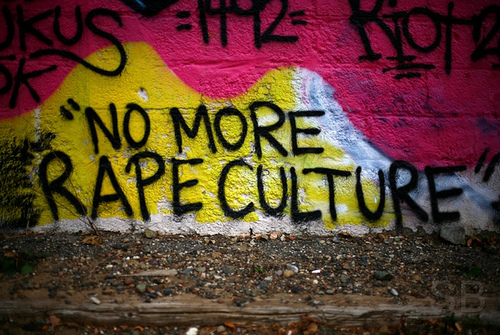http://youthvector.com/celebrating-womens-day-5rape-culture-and-popular-media/You might have heard the term "rape culture" more than usual recently, in light of the conviction of the two high school football players in Steubenville, OH. These two young men were found guilty of raping a young, passed out woman at a party. There was ample social media evidence (including video, texts, and a photo) to show how there were many bystanders as they raped her and how some of the group of men then mocked the girl and the situation.
What is "rape culture" and how is that term relevant here? Rape culture is a term to describe prevailing social norms around gender, sex, and communication that faciliate an implicit acceptance of sexual assault humor and rape circumstances. In a rape culture, sexual coersion is a normalized part of sexual interaction. While this might sound extreme to some people, consider these excerpts from Lauren Nelson in her "So You're Tired of Hearing about 'Rape Culture'" essay:
"Rape culture is when a group of athletes rape a young girl, and though there are dozens of witnesses, no one says, “Stop.”
Rape culture is when a group of athletes rape a young girl, and though there are dozens of witnesses, they can’t get anyone to come forward.
Rape culture is when a group of athletes rape a young girl, and adults are informed of it, but no consequences are doled out because the boys “said nothing happened.”
Rape culture is when a group of athletes rape a young girl, and we later find out that their coaches were “joking about it” and “took care of it.”
Rape culture is when a group of athletes rape a young girl, and even though there is documentation of the coaching staff sweeping it under the rug, they get to keep their jobs.
Rape culture is when a group of athletes rape a young girl, and one of the coaches involved in the cover-up threatens a reporter - saying, “You’re going to get yours. And if you don’t get yours, somebody close to you will.” – but the town is more worried about keeping their coaching talent than his integrity.
Rape culture is when a group of athletes rape a young girl, but because it happens at a party where both sexes were drinking, complete strangers on the internet argue ferociously that she is to blame for being attacked."
It's hard to ignore when you consider these facts. Being in a rape culture does not mean that as a society we publicly or overtly condone rape. But it does mean that we have a lot of backwards views on gender roles, the importance of athletics, personal responsibiliy, group mentality, sexual interactions, and sex education. We have a lot of shame around sex as a society, which I think is an important underlying component of our inability to think outside the box in difficult situations like Steubenville. Many would rather blame a victim instead of sitting with the discomfort of owning the state of affairs around sex...and then taking a stand to do something different.
If you're a parent out there who is not sure how to talk to your sons about these topics, so that they grow up to be respectful teenagers and men, and know that they have a voice in such situations, read this powerful letter from a mom to her sons.
~Dr. Jenn Gunsaullus, San Diego, CA -- Sociologist, Sexologist, Sexuality/Gender/Mindfulness Speaker















































